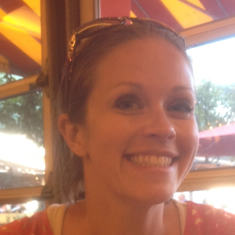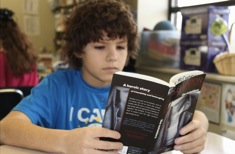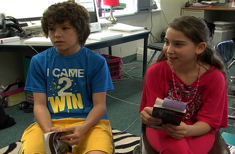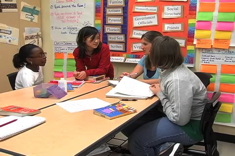I looked at Michael’s latest reading reflection and sighed. It was January, and he was still struggling to make progress in his ability to demonstrate deep thinking about his independent reading. His typical reading response had simple, often inaccurate, and only tangentially-related connections like this one: “(Two male friends) reminded me of the brothers in the other book.”
Every trick in my bag had been tried. I’d started by trying to help him adjust his independent reading choices. For example, he’d been skating his way through Rick Riordan’s The Titan’s Curse and wanted desperately to move on to The Battle of the Labyrinth
when Andrew Clements’s Frindle
would have been a more appropriate choice. I’d torn out my hair trying audio books, administering word analysis probes, showing work samples to more competent colleagues than myself, writing reflections side by side with him, and helping him rework his previous pieces.
“Why isn’t he making progress?” I groaned. Progress, progress, progress. I was worried I wasn’t helping this reader grow.
In the era of value-added measures, I find myself using more and more tools to measure student progress. In addition to administering a twice-yearly assessment designed to show change in student readers over time, I also administer district-level diagnostic assessments, as well as rubric-scored, classroom-based measures. My colleagues and I have gathered a lot of great data about our students.
On most of these assessments, Michael was struggling and stagnating. He’d scored at the intervention level on a below-grade level text. Despite my well-meaning support, he was not making the growth I needed him to make. Michael made me wonder — had I just been inflicting assessments on him? Was it equally important, and would it be more effective, for me to make him a part of the data collection process?
Time to Change Directions
I needed different, ground-level information to figure out what was going on in Michael’s head. I needed yet another assessment, yes, but one that would open the conversation to include Michael. I needed to have a better sense of what was going on in his head, and hey, if I was going to tear apart my own classroom practice, I should probably peer into the minds of my other students too. I decided that I would invite all of my students to complete a mid-year progress reflection.
The next week, students spent a class period with their notebooks in front of them, reading through their writing, reading calendars, reflections, and texts they’d annotated throughout the year. Surprisingly quiet, they pulled out pieces that would help them reflect on the following questions:
- Which piece shows you at your very best as a reader?
- Which piece shows you at your very best as a writer?
- What trends do you notice in your work?
- Describe one area in which you’ve improved this year. Give examples from your work.
- Tell me one area of reading or writing which needs more focus. Give me one suggestion for how I can help you improve in this area.
“I’ve gotten better with my one-pagers,” wrote Janelle of the Kelly Gallagher-inspired progress measure I use to gauge students’ understanding of their independent reading. “I’ve started to add more evidence when I write about my reading.”
Another student looked through his reading calendar and noticed that he’d devoted more time each month to his independent reading.
“During September I would only read 20 minutes at a time,” he wrote. “Now in January I am reading for 60-90 minutes at a time.”
I got to Michael’s paper, and my heart dropped. In the “trend” section, Michael wrote that he noticed that he’d gotten better in reading that year: “Like, I first started with two books, then I started adding books one by one, then I ended up reading seven books, which helped me in reading continuously. (Last month) my reading goal was achieved quick and easy as the nonfiction genre was interesting.”
His new literacy goal was to work on forming sentences. No mention of any reading work.
Regardless of his scores and the extra support he’d been receiving, Michael’s perception was that his reading was just fine. I’d been asking Michael the wrong questions. Actually, I hadn’t been asking Michael any questions at all.
Inviting Michael into the Conversation . . . For Real
Perhaps I had been sending out conflicting messages. Michael had clearly listened to the parts of our class discussions about reading more and about setting goals. By that measure, he was doing well. He took his independent reading seriously, and he had a sense of pleasure about reading that I did not want him to lose in our data dig. I prided myself on being an active listener with my students and on giving them specific, helpful feedback on their work. Now I was embarrassed. I wondered if by not inviting Michael’s feedback earlier into the conversations about the other measures, he didn’t own the results of those assessments. No wonder he had little awareness of or regard for his trouble with reading comprehension.
I needed to dig deeper to get more feedback directly from him. I found that:
- He got positive feedback at home — lots of it.
- His parents were puzzled by my progress measures. He’d been doing quite well in his workbooks at home.
- He thought that he was a good reader, but he didn’t think that I thought he was a good reader.
- He enjoyed reading.
In February, I organized all of my data (the original data, and the kid-provided direct feedback) into a chart and had Michael look at it again. I had him reflect again on what he saw. This time as I explained to him what all of the numbers and all of my notes meant, he was able to tell me that he struggled with literal comprehension of grade-level texts, and he also struggled with vocabulary. As we worked through all of the information together, I was careful to let him know that the numbers did not define him as a reader, but that they were a part of a broader and important picture. Noting that he perceived that I did not think he was a good reader, I added that I was pleased with both his increased volume of reading, and of the thinking he was doing about himself as a reader.
The next month, Michael’s self-selected goal was to work on his vocabulary knowledge by collecting new words from his books and practice using them in his notebook; he wrote that he needed to work on “knowing when I didn’t know words and trying to learn new words.”
As I continue to weigh negotiable and non-negotiable assessments, I’ll never forget Michael’s powerful lesson. I’ve learned that I lose so much of the potential of progress measures when my students have no ownership of them. By the way, Michael’s end-of-the year assessments showed that because of the power of his own reflection and buy-in, he finally made great progress.









